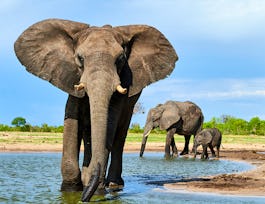Sound economic thinking is crucial for farmers because they depend on good economic decision making to survive. Governments depend on economic information to make good policy decisions on behalf of the community. This course will help you to contribute to better decision making by farmers, or by agencies servicing agriculture, and it will help you to understand why farmers respond to policies and economic opportunities in the ways they do.



Agriculture, Economics and Nature

Instructor: Professor David Pannell, BSc(Agric), BEc, PhD
Sponsored by IEM UEM Group
50,745 already enrolled
(505 reviews)
Skills you'll gain
- Economics, Policy, and Social Studies
- Finance
- Supply And Demand
- Policy Analysis
- Corporate Accounting
- Environment and Resource Management
- Environmental Policy
- Environmental Resource Management
- Economics
- Policy Development
- Policty Analysis, Research, and Development
- General Accounting
- Natural Resource Management
- Business Economics
- Financial Management
- Financial Analysis
- Management Accounting
- Cost Benefit Analysis
- Social Studies
Details to know

Add to your LinkedIn profile
7 assignments
See how employees at top companies are mastering in-demand skills


Earn a career certificate
Add this credential to your LinkedIn profile, resume, or CV
Share it on social media and in your performance review

There are 7 modules in this course
Week 1 provides a history of agricultural production and prices, an examination into the reasons behind changes in production and prices, and discussions of the 2007 global food crisis and agriculture’s usage of resources.
What's included
11 videos9 readings1 assignment
Week 2 addresses the agricultural issues of water availability, peak phosphorus, herbicide resistance, and climate change.
What's included
9 videos8 readings1 assignment
Week 3 looks at the relationship between inputs and outputs, the optimal level of an input, the question of pollution from inputs, and flat payoff functions.
What's included
9 videos4 readings1 assignment
Week 4 focuses on evaluating land conservation practices, weighing benefits and costs correctly, non-economic factors, and provides an example in conservation agriculture.
What's included
9 videos6 readings1 assignment
Week 5 discusses the importance of extending economics beyond the farm gate, characteristics of agri-environmental projects, Benefit: Cost Analysis, and provides an example with Gippsland Lakes.
What's included
8 videos7 readings1 assignment
Week 6 ties up the course through discussion of government policies that support agriculture, policies that protect the rural environment, policies with problems, and justifications for agricultural policy.
What's included
8 videos8 readings1 assignment
What's included
1 assignment
Instructor

Offered by
Why people choose Coursera for their career




Learner reviews
505 reviews
- 5 stars
76.92%
- 4 stars
19.52%
- 3 stars
2.56%
- 2 stars
0.59%
- 1 star
0.39%
Showing 3 of 505
Reviewed on Apr 14, 2020
After completing studies in Agriculture 20+ years ago, I found this course to be a great refresher and really opened my eyes to the economics of resource management.
Reviewed on Dec 19, 2018
Interesting material, good presentation and explanations. Provided some incentive to undertake other similar MOOC's if they become available.
Reviewed on Jan 7, 2023
A very insightful course. This course provided all the lessons from the very basic to the core of agricultural and environmental economics.
Recommended if you're interested in Social Sciences

University of Illinois Urbana-Champaign

American Museum of Natural History

The University of Sydney

Yale University

Open new doors with Coursera Plus
Unlimited access to 10,000+ world-class courses, hands-on projects, and job-ready certificate programs - all included in your subscription
Advance your career with an online degree
Earn a degree from world-class universities - 100% online
Join over 3,400 global companies that choose Coursera for Business
Upskill your employees to excel in the digital economy


